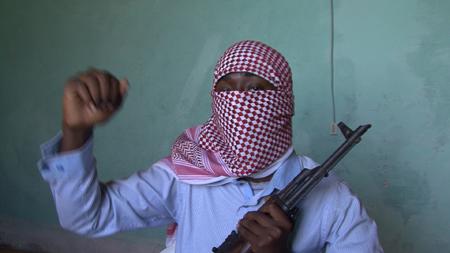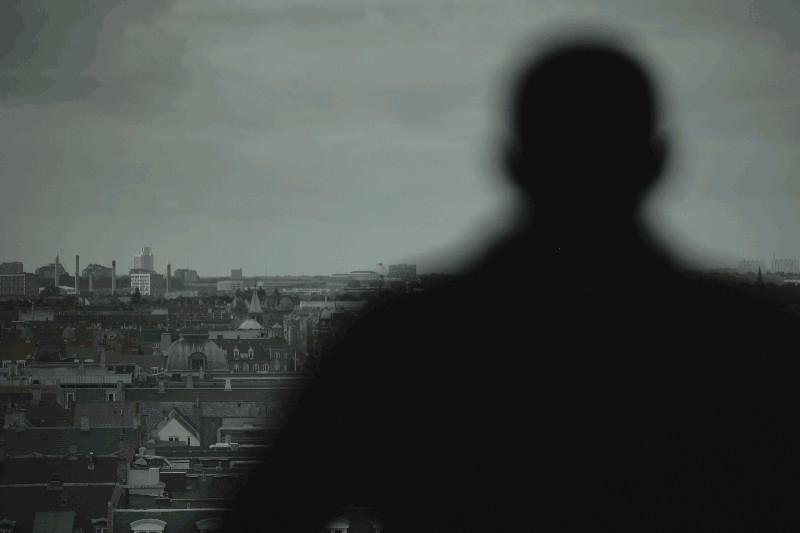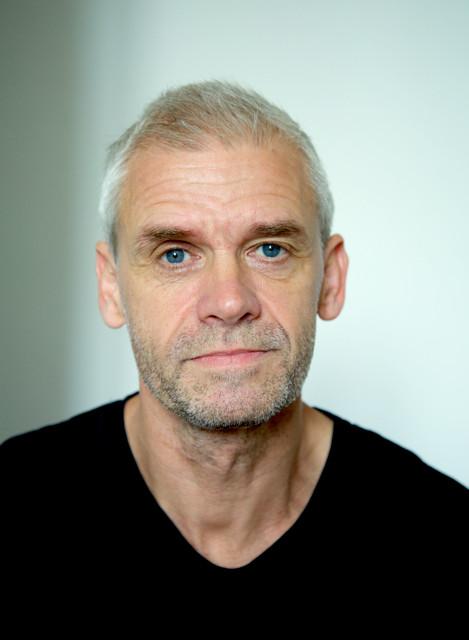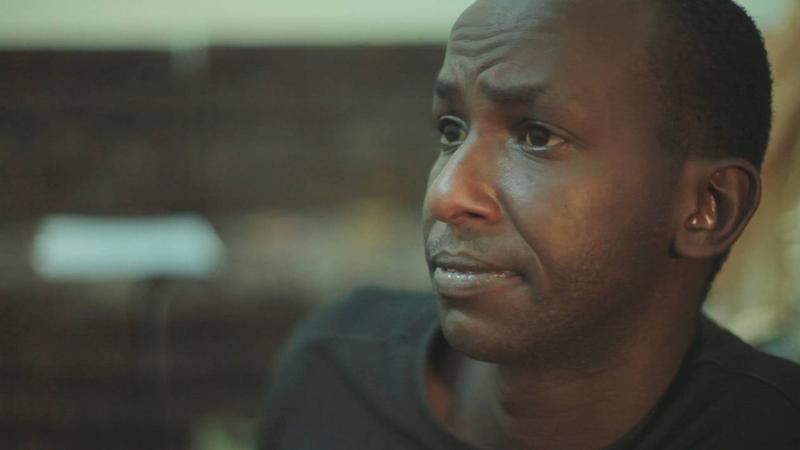Something is just about to happen. We can tell from his eyes. They are distant, detached. Almost dreaming.
"It's important to remember that these people are a product of our own world." -Jakob Sheikh
Abdi has taken a seat in one of the front rows and is now pointing a silver-coloured pocket camera at the stage, pretending to be a journalist.
But the big white costume he is wearing tells another story. Under it, Abdi, presumably, is concealing the object that will seal his fate in a few short seconds.
We are in a hotel in Somalia's capital Mogadishu, where a group of graduating doctors in ties are being honoured by their university. In many ways the embodiment of Somalia's future, they are being applauded one after another by their families and loved ones. It's a moment to remember.
And then …
Boom.
A massive explosion. Sounds of screaming, broken windows and a room collapsing in on itself. Feelings of chaos, fear, utter panic.
When the smoke clears: the sight of pools of blood on the floor, mangled corpses and soldiers lifting rubble, looking for body parts.
It's incomprehensible how someone would so destructively take the lives of the country's best and brightest. It seems even more incomprehensible that the person who triggered the suicide bomb that December day is Abdi, a young man who grew up in a Copenhagen suburb, played football and lived a relatively normal life as a young person in Denmark.
Abdi is far from the only tragic case of a young man who has been shaped by the Danish welfare society but still seeks the extreme and ultimately pushes the detonator button, taking a crowd of innocent people with him into death. The following year, his Somali-Danish friend Hassan blows himself up in a crowd of civilians in Mogadishu's airport.
How on earth could this happen?
This tumultuous and highly dramatic scene opens "Warriors from the North", a documentary that takes us close to a secret Somali-Danish cell in Copenhagen, whose members swear allegiance to the militant terrorist organisation al-Shabaab.
Copenhagen's Somali community is notoriously difficult to penetrate, and militant Islamists obviously don't share their insurrectionary plans. So it's even more remarkable that an outsider managed to get access to the world of a small group of young men declaring their willingness to kill in the name of God. A world we way too often see splashed across front pages but way too rarely get a window into that might provide some kind of understanding. A world that shows us that hardened Jihadists rarely begin their radicalisation process as hardened Jihadists but as socially marginalised young people groping for something to stand on, a community to believe in and a burning cause to ignite them.
Abdi, Hassan and their friend Mohammed seem to have been lifted straight out of that narrative. While the first two men today are dead, Mohammed remains in Somalia. The story of the three young men and the brotherhood that prepared them to pay the ultimate price for their faith is laid out by "The Shadow," an anonymous fourth member of the cell, who got out of the radical Islamist scene in time and now, for the first time ever, tells the story of al-Shabaab's recruitment in Denmark.
This human development is what's so important for us to understand. As a journalist who writes about radicalisation and terrorism on a daily basis, it's my experience that the nuances are often lost in a fog of salacious headlines, limited column space and dramaturgical devices. I, too, have been guilty of generalising when complex issues have to be broken down and mass-communicated in a split second.
We far too often forget that these people aren't pariahs but a part of us. They grew up in our backyards, were shaped by our social institutions, they speak perfect Danish, seamlessly navigate our community and don’t always come from deeply religious families at the bottom of society. Far too often we find that the feeling of self-worth and brotherhood that militant communities provide is something that the established society in many cases could have given them.
Where does that leave us? In a place where we have to acknowledge that relieving these people of their brutal mindset takes understanding and acknowledging what value a community like the Somali-Danish cell in Copenhagen has.
That's why "The Shadow," who today has turned his back on his fundamentalist past, still talks about his time with the cell as the best time of his life. That's why Mohammed in Somalia doesn't return to his frustrated father, Abukar, in Denmark, who has dedicated his life to getting his son back alive. And, essentially, that's why Abdi and Hassan ended up becoming suicide bombers.
We need stories like Hassan's, Abdi's and Mohammed's to be able to comprehend the big picture – that we are currently seeing a flood of holy warriors leaving Denmark to fight in armed conflicts, in numbers that haven’t been seen since World War II.
That's the perspective. It's in this context that we can learn from the warriors from the north and their stories. While politicians in Denmark and the rest of Europe are desperately trying to stem the tide of emigrating Jihadists, it's important to remember that these people are a product of our own world, which is how they must be met. They are an expression of enormous social challenges that must be solved by society, not by people who get cold feet at the prospect of restrictions like revoking passports and residency permits.
As a 27-year-old Pakistani-Danish warrior in Syria told me recently, "Listen, I'm not afraid of being hated in Denmark. Why would I try to gain respect in Danish society when Danish society never gave me any respect until now?"
Which takes us back to Abdi and his silver-coloured pocket camera. To the question of how this could ever happen.
We ask ourselves if this young Somali Dane had an alternative to blowing himself up? Could the tragedy have been stopped in time?
"Warriors from the North" doesn't shove answers down our throats. We have to think for ourselves. And maybe that's what we really need the most. To think.
"Warriors from the North", selected for the Mid-Length Competition at IDFA, is produced by Helle Faber for Made in Copenhagen.





